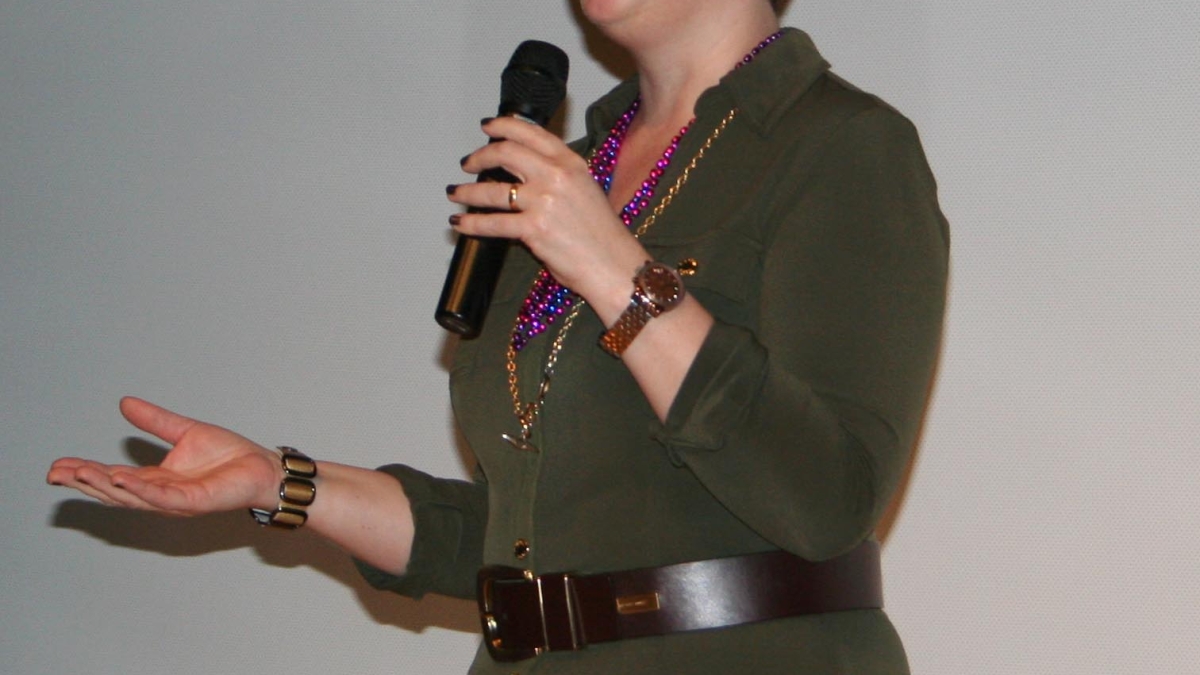Pitching competition encourages ASU science students to think like entrepreneurs

A self-described introvert, Kali Johnson isn’t necessarily comfortable on stage.
But that’s exactly where the 25-year-old Arizona State University student found herself – in front of a panel of judges during the Great SESE Pitching Competition. Johnson was pitching an idea for a student organization that will create support systems for ASU students who are also parents to help them succeed.
The competition, organized by ASU’s School of Earth Sciences and Exploration (SESE) with support from ASU’s Office of Entrepreneurship and Innovation, is one of a growing number of efforts across the university to encourage entrepreneurial thinking in ASU graduate and undergraduate students, including students who don’t necessarily see entrepreneurship as a career goal. Two winners – first place and audience favorite – were selected from undergraduate as well as graduate student categories, and won a total of $3,000 in prize money.
The idea for the competition is the brainchild of Lindy Elkins-Tanton, director of the School of Earth Sciences and Exploration. According to her, the traditional approach of educating students, especially those pursuing graduate degrees, leaves much to be desired.
“While we’re doing a wonderful job of training our students to be brilliant researchers, we need to start teaching them other useful life skills, such as the ability to pitch an idea, to speak compellingly to others, to negotiate and write budgets, etc., that will take our students to the next level,” she said.
Elkins-Tanton decided to tackle this problem. First, she enlisted the support of SESE faculty members and Mitzi Montoya, vice president and university dean of entrepreneurship and innovation at ASU. Montoya funded the two first prizes and found Elkins-Tanton pitching trainers to help graduate students hone their pitches and communicate their ideas effectively to the judges and the audience.
“Our graduate students then trained our undergraduate students, using the expert advice they’d just received,” she said. “The peer-to-peer mentoring was very effective in helping our incoming freshmen think about education and their college experience in a different way.”
Entrepreneurial spirits
Kali Johnson, a sophomore majoring in astrobiology and biogeosciences, first joined ASU in 2007 but had to drop out a year later because of health reasons. Determined to stay on path, she went on to get her associate’s degree in arts and worked in retail for a few years. Then came the turning point: She gave birth to her daughter.
“I didn’t want her to think that I gave up too easily on my dreams, so I came back to ASU to earn my degree,” she said. “However, I quickly realized that I needed more support in terms of information, networking and scholarship opportunities to finish my degree, especially as a young parent, and thought this was an opportunity to create something that will outlast my time at ASU.”
Johnson pitched the idea for the Proud Parent Scholarship Fund at the Great SESE Pitching Competition and won $500 as part of the audience’s choice award in the undergraduate category. Kevin Conklin, an astrophysics junior, won the first place and $1,000 to fund his venture: a weekly podcast called ASU Connections that aims to educate, entertain and attract people to scientific research and scientists at ASU.
“I decided to join ASU to earn my college degree after listening to a podcast featuring ASU planetary scientist and astronomer Jim Bell talking about the Mars Curiosity Rover and his involvement in the project, which blew me away,” said Conklin. “Through the ASU Connections podcast, I’d like to build a brand of educated people who take their science seriously but also like to have fun with it.”
Combining research and entrepreneurial ideas
According to Elkins-Tanton, while most undergraduate students focused on ideas that were inspired by academic disciplines, graduate and doctoral students pitched ideas for research projects on earth sciences-related topics.
Abhijith Rajan, a doctoral student of astrophysics at SESE and first prize winner in the graduate student category, proposed hosting a two-day Software Carpentry workshop at ASU that teaches students to be efficient software programmers and, consequently, better researchers. Software Carpentry is a nonprofit organization whose members teach researchers basic programming skills. Rajan hopes to launch the program in the summer and make it self-sustaining.
“We have identified local resources, including students in the department, who will teach sections to help make the program more affordable and, going forward, completely free for the department,” he said.
Jean François-Smekens, another SESE doctoral student who won the audience choice award in the graduate student category and a sum of $500, pitched an idea that turns a sulfur dioxide camera – digital cameras that monitor sulfur dioxide emissions during volcanic activity – into a practical tool for volcano monitoring.
Mitzi Montoya, vice president and university dean of entrepreneurship and innovation at ASU, views the Great SESE Pitching Competition as an example of a larger culture change underway ASU.
“At ASU, we are creating a pipeline of graduates who think differently,” said Montoya. “Programs like SESE inspire students to do something out of their comfort zone. This exposure to new ways of thinking and problem-solving helps develop an entrepreneurial mindset that is needed to succeed in any field. Programs like this show ASU’s university-wide commitment to fostering entrepreneurial and innovative ASU students in all academic disciplines.”